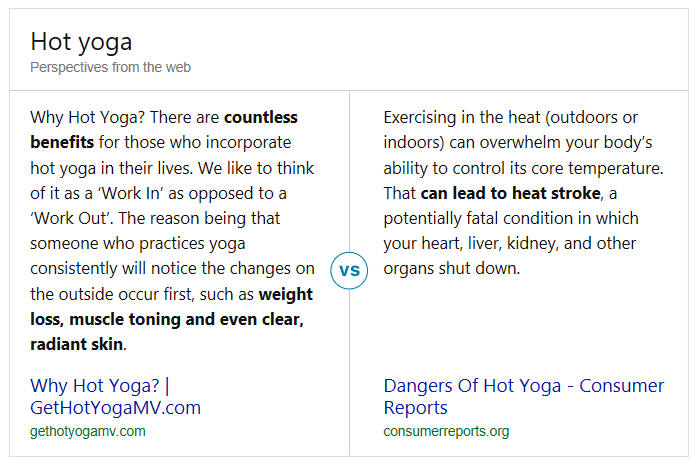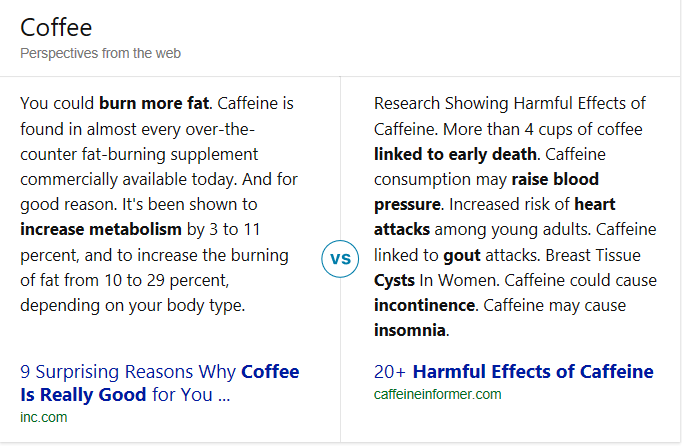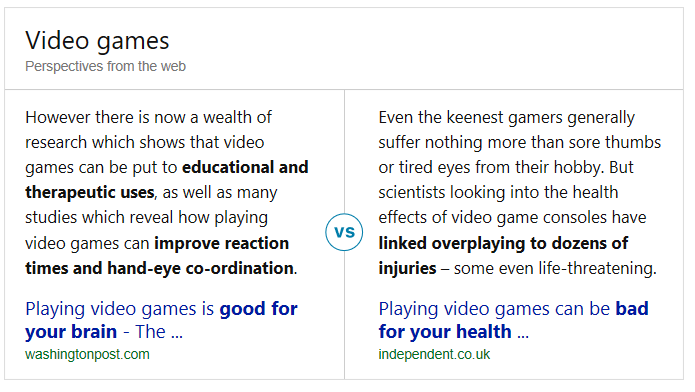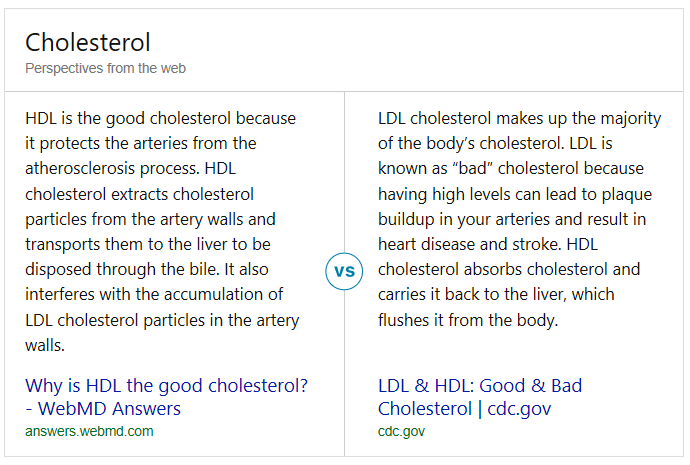In December, we launched several new Intelligent Answers that go beyond the traditional Q&A style of search and offer answers to more complicated questions. We received so much interest in providing multiple perspectives to an answer, that we wanted to share more details on how it came about and what we are doing to make it possible.
I’m a big yoga fan and have been practicing it for years. A few months ago, I decided to try hot yoga for the first time. When I got to the studio, I noticed that the temperature was way hotter than expected, and I forgot to bring a water bottle.
I’m a big yoga fan and have been practicing it for years. A few months ago, I decided to try hot yoga for the first time. When I got to the studio, I noticed that the temperature was way hotter than expected, and I forgot to bring a water bottle.
The class was amazing, but I felt dizzy and lighthearted. I couldn’t help but wonder… is hot yoga good for me?
I decided to Bing my question to learn more about it. At the very top, Bing had the following answer:
“Why Hot Yoga? There are countless benefits for those who incorporate hot yoga in their lives. We like to think of it as a ‘work in’ as opposed to a ‘work out’. The reason being that someone who practices yoga consistently will notice the changes on the outside occur first, such as weight loss, muscle toning and even clear, radiant skin.”
This was good. I quickly received an answer confirming that hot yoga was a healthy sport from a relevant site. But I knew there might be some drawbacks for hot yoga as well. I repeated my search as {is hot yoga bad for you} and got another answer, this time showing that hot yoga could be dangerous.
That’s when it struck me: There are many questions that don’t have just one answer, but multiple valid perspectives on a given topic. Should I repeat my search with the word “bad” or “good” in it every time I wanted to get a comprehensive picture of a topic and hear the other side? How would I even know how and when to do that? Should I assume that this single answer Bing returned for me was the best or the only answer? Is that the most authoritative page to answer my question?
How do we solve this problem?
Search results are often limited to many blue links and sometimes one link and snippet of text highlighted at the top. But there are many questions where getting just one point of view is not sufficient, convenient or comprehensive.
Many times, you want to hear different perspectives, points of view and opinions about a question you have. Today, when you use a search engine to find answers to your questions, your experience can quickly turn into an echo chamber because search results often cover just one side of the spectrum of possible answers to your questions, which can lead to “confirmation bias.”
As announced at the Microsoft AI event in December 2017, we believe that your search engine should inform you when there are different viewpoints to answer a question you have, and it should help you save research time while expanding your knowledge with the rich content available on the Web. Therefore, we built a new experience for you.
Try “is hot yoga good for you” today and you will now see both perspectives.

Clicking on the right-hand side helped me learn that I need to drink lots of water, stretch properly and cover the yoga mat with a towel to avoid breeding germs on it.

Clicking on the right-hand side helped me learn that I need to drink lots of water, stretch properly and cover the yoga mat with a towel to avoid breeding germs on it.
How does Multi-Perspective QnA work?
Based on processing billions of queries and web pages, Bing intelligently understands when your question or topic of interest has various valid perspectives and can show you snippets explaining those opinions from passages or short blurbs of text extracted from many different websites. Thus, we can now keep you well-informed on topics that have opposing viewpoints. Using several different models in combination, we prioritize reputable content from authoritative, high quality websites that are relevant to the subject in question, have easily discoverable content and minimal to no distractions on the site.
When you issue a search query like “is coffee good for you”, passage candidates from web pages are selected based on our powerful Web Search and Question Answering engine. After that, we build clusters over the passages to determine similarity and sentiment using deep recurrent neural network (Deep RNN) models. Lastly, we rank the most relevant passages from each cluster based on sentiment analysis and several other features, to deliver you the most relevant results from web sources. This process is summarized in the following image.


One of the key challenges in this project was building the Deep RNN since existing state of the art sentiment classifiers were limited in their ability to extract the correct sentiment from web passages. For example, take the passage below:
"You could burn more fat. Caffeine is found in almost every over-the-counter fat-burning supplement commercially available today. And for good reason. It's been shown to increase metabolism by 3 to 11 percent, and to increase the burning of fat from 10 to 29 percent, depending on your body type.”
Existing classifiers would report that the passage had a negative sentiment since there are words such as “burn” and “fat”. However, our deep neural network-based models are specifically built to handle web data. As a result, they correctly detect that the passage above has a positive sentiment: it describes the benefits of coffee.
So, when you search “is coffee good for you” on Bing, we show you passages as search results that offer you two different perspectives on this topic instead of just one side. This allows you to see this topic from multiple viewpoints, enriching your understanding and allowing you to form your own opinion.
So, when you search “is coffee good for you” on Bing, we show you passages as search results that offer you two different perspectives on this topic instead of just one side. This allows you to see this topic from multiple viewpoints, enriching your understanding and allowing you to form your own opinion.
Try it today!

Want to learn why video games are good? Just don’t show this to kids!

This is just the beginning. We will expand this functionality to address many more questions you have, increase coverage, and expand beyond the US, starting with the United Kingdom in the next few months.
At Bing, we apply cutting-edge AI technology to help you easily find the best variety of viewpoints on the Web for the topics that matter the most to you. If you want to learn about something new or need to find several opinions about a topic, Bing will be there to help you every step of the way.
Try it today and share your feedback directly from www.bing.com!
Happy 2018!
-Mir Rosenberg on behalf of the Bing Multi-Perspective Team


